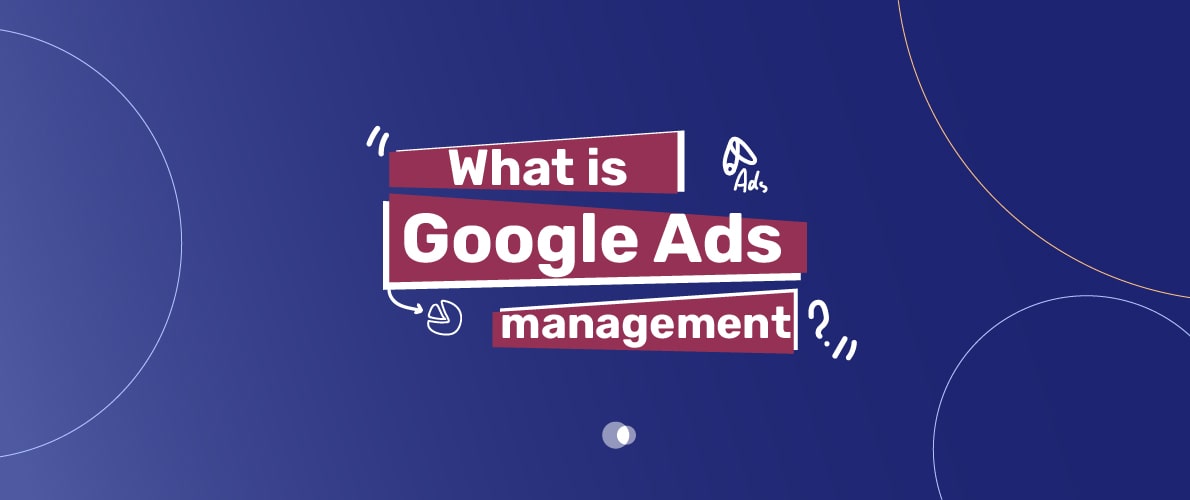Did you know that businesses get an average of $2 in revenue for every $1 they spend on Google Ads? This highlights why Google Ads is a top choice for businesses aiming to grow online and boost sales. But just setting up a Google Ads account and running a few ads isn’t enough for success. That’s where Google Ads Management Optimize Campaigns comes in. It involves planning, running, and continuously improving paid ads on Google Ads to achieve the best results.
Table of Contents
Google Ads management means planning, running, and improving paid ads on Google Ads. Working with a Google Ads company or a skilled Google Ads manager can make sure your ads start off right. To do well in Google Ads, you need to know the platform well, follow best practices, and keep tweaking ads based on how they’re doing.

Whether you’re a small business just starting with paid ads or a big company wanting to improve your ads, getting help from a Google Ads management agency can pay off. It can help you get the most out of your ad budget and reach your marketing goals sooner.
Key Takeaways
- Google Ads management is key for businesses wanting to get the most from their paid ads on Google Ads.
- Working with a Google Ads agency or hiring a Google Ads manager can ensure your ads start strong.
- Good Google Ads management means knowing the platform well, following best practices, and adjusting ads based on results.
- Investing in professional Google Ads management can help businesses get the most from their ad budget and meet their marketing goals faster.
Understanding Google Ads and Its Benefits
Google Ads, once known as Google AdWords, is a powerful online ad platform that helps businesses reach their audience through pay-per-click advertising. With Google’s vast network, ads can appear at the perfect time and place for potential customers.
However, to ensure that your ads perform well and bring the desired results, it’s important to focus on AdWords Management Optimize Campaigns. This process helps refine targeting, adjust bids, and continuously improve ad performance, ensuring that every campaign is as efficient as possible.
How Google Ads Works
Google Ads uses an auction system where advertisers bid on keywords related to their products or services. What is Google Ads management? It’s the process of strategically bidding and optimizing ads to ensure they reach the right audience. When someone searches for those keywords, the highest bids and best ads show up first. This is where Google Ads Management Optimize Campaigns comes into play—it ensures that your campaigns are continuously optimized to improve performance, refine targeting, and maximize ROI. You only pay when someone clicks on your ad, making it a smart way to get more website visitors.

Advantages of Using Google Ads for Your Business
Google Ads has many benefits for businesses wanting to grow online and meet their marketing goals:
- Targeted advertising: You can target your ads to specific groups, locations, and interests. This ensures your message gets to the right people.
- Increased brand visibility: Your brand gets more exposure and credibility when it shows up at the top of search results. This builds trust and awareness.
- Measurable results: Google Ads gives you detailed reports and analytics. You can track your campaign’s success, measure ROI, and make smart decisions to improve your advertising efforts.
- Flexibility and control: You have full control over your budget, ad content, and targeting. This lets you adjust your campaigns to meet your goals.
“Google Ads has been a game-changer for our business. It has allowed us to reach our target audience effectively and drive meaningful results.” – Sarah Johnson, Marketing Manager
By understanding Google Ads and its benefits, businesses can use this platform to grow online. They can attract more leads and increase revenue through effective targeted advertising campaigns.
Key Components of Google Ads Management
Effective Google Ads management includes several key parts. These parts work together to make a successful ad campaign. By focusing on keyword targeting, ad copywriting, and landing page optimization, businesses can get the most out of their ads. This helps them reach their marketing goals.
Keyword Research and Selection
Keyword research is the foundation of any Google Ads campaign. It’s about finding the right keywords that match your business and target audience. This process is a key part of What is Google Ads management, as it ensures your ads appear for people actively searching for what you offer.

When researching keywords, look at search volume, competition, and relevance. Google Keyword Planner can help find good keywords and predict their performance. Use a mix of broad, phrase, and exact match keywords to catch different buyer stages.
Ad Copy Creation and Optimization
Creating catchy ad copy is key to getting clicks and conversions. Your ad text should be short, grab attention, and show what makes your product or service special. Use your target keywords naturally to boost relevance and quality score.
Great ad copy speaks directly to the needs and desires of your target audience, enticing them to take action.
To improve your ad copy, try different headlines, descriptions, and calls-to-action. Use ad extensions to add more info and make your ads stand out. Keep testing and refining your ad messaging to find what works best.
Landing Page Design and Development
The success of your Google Ads campaign depends on your landing pages. A good landing page matches your ad copy and offers a smooth user experience. It should clearly show the value of your product or service and guide visitors to take action.
Design your landing pages to be simple, clear, and visually appealing. Use engaging headlines, persuasive copy, and attractive images to grab attention. What is Google Ads management? It includes optimizing landing pages to work well on mobile devices, load quickly, and keep visitors engaged. Regularly test and improve your landing pages to boost their effectiveness.
Setting Up and Structuring Google Ads Campaigns
Creating a well-structured Google Ads campaign is key to reaching your goals and getting the most from your investment. A good campaign structure helps you target the right audience, manage your budget, and make your ads work better.
The first step is to set your campaign’s goals and settings. You need to pick the campaign type, like Search or Display, and choose where you want to reach people. Also, set your daily budget. Make sure your campaign settings match your business goals and who you want to reach.
Then, organize your campaign into ad groups. Each ad group should have related keywords and ads for a specific theme or product. This way, you can make ads that really speak to your audience.
A well-structured ad group can significantly improve your campaign’s performance and quality score.
Here are some tips for creating ad groups:
- Group keywords by theme, product, or service
- Keep ad groups focused and specific
- Create compelling ad copy that matches the intent of your keywords
- Use ad extensions to provide additional information and improve click-through rates (CTR)
Let’s say you’re running a Google Ads campaign for a fashion e-commerce store:
| Campaign | Ad Group | Keywords |
|---|---|---|
| Summer Fashion Sale | Women’s Dresses | summer dresses, maxi dresses, casual dresses |
| Men’s Shorts | men’s shorts, cargo shorts, denim shorts | |
| Accessories | sunglasses, hats, beach bags |
After setting up your campaign, it’s important to keep an eye on it and make changes as needed. Regular campaign optimization means looking at how your campaign is doing, making smart choices based on data, and tweaking things to get better results. This might include adjusting bids, refining keywords, testing different ads, and improving landing pages for a better user experience and more conversions.
Bidding Strategies and Budget Allocation
Managing a Google Ads campaign means picking the right bidding strategies and setting a good budget. Google Ads has many bidding options. These options help you reach your advertising goals, like getting more clicks or conversions.
Understanding Bidding Options in Google Ads
Google Ads has several bidding strategies to match your goals:
- Cost-per-click (CPC) bidding: You set a max bid for each ad click.
- Cost-per-thousand-impressions (CPM) bidding: You pay for every 1,000 ad views.
- Cost-per-acquisition (CPA) bidding: You aim for a specific cost per conversion.
- Enhanced cost-per-click (ECPC) bidding: Google adjusts your bids to boost conversions.
“Choosing the right bidding strategy is key to better Google Ads performance and higher ROI.”
Determining the Right Budget for Your Campaigns
Good budget management is crucial for your Google Ads campaigns. Think about your target audience, competition, and goals when setting your budget. It’s smart to spread your budget across campaigns and ad groups based on their success and potential.
| Campaign Type | Recommended Budget Allocation |
|---|---|
| Brand Awareness | 20-30% |
| Lead Generation | 30-40% |
| Sales and Conversions | 40-50% |
Keep an eye on how your campaigns are doing and tweak your budget and bidding strategies as needed. What is Google Ads management? It involves optimizing your bids and budget to secure better ad placements, attract more quality traffic, and increase your ROAS.
Monitoring and Analyzing Campaign Performance
After starting your Google Ads campaigns, it’s key to watch their performance closely. Use Google Ads reporting tools to track important metrics. This helps you understand how your campaigns are doing and make smart choices to improve them.
Key Metrics to Track in Google Ads
To keep an eye on your Google Ads campaigns, focus on these key metrics:
- Click-through rate (CTR): The percentage of people who click on your ad after seeing it.
- Conversion rate: The percentage of clicks that result in a desired action, such as a purchase or form submission.
- Cost per click (CPC): The average amount you pay each time someone clicks on your ad.
- Cost per acquisition (CPA): The average cost for each conversion or desired action.
- Quality Score: A metric that assesses the relevance and quality of your ads, keywords, and landing pages.
Tracking these google ads metrics helps you see what’s working and what needs work.
Using Google Ads Reporting Tools
Google Ads has many reporting tools to help you track your campaign performance:
| Reporting Tool | Description |
|---|---|
| Campaign Performance Report | Provides an overview of your campaign’s key metrics, such as clicks, impressions, and conversions. |
| Ad Group Performance Report | Offers insights into the performance of individual ad groups within your campaigns. |
| Keyword Performance Report | Displays data on the performance of specific keywords, including clicks, impressions, and conversion rates. |
| Conversion Tracking Report | Tracks the number of conversions generated by your ads and provides valuable data for conversion tracking and optimization. |
Regularly reviewing your Google Ads performance reports is essential for making informed decisions and optimizing your campaigns for better results.
By using these reporting tools and focusing on key metrics, you can understand your campaign performance well. This helps you make data-driven decisions to enhance your performance reporting and Google Ads management strategy.
Optimization Techniques for Google Ads Campaigns
To get the most out of your Google Ads campaigns, it’s crucial to continuously optimize and refine your approach. By implementing strategic campaign optimization techniques, you can enhance the performance of your ads. This attracts more qualified leads and maximizes your return on investment.
A/B Testing Ad Copy and Landing Pages
One effective optimization technique is conducting A/B testing on your ad copy and landing pages. This involves creating multiple versions of your ads and landing pages. Each version has slight variations in messaging, design, or call-to-action.
By comparing the performance of these variations, you can identify which elements resonate best with your target audience. This allows you to make data-driven decisions to improve your campaigns.
Refining Keyword Targeting and Match Types
Another key aspect of campaign optimization is refining your keyword targeting and match types. Regularly review your keyword performance data to identify high-performing keywords and those that are not delivering the desired results. Adjust your keyword bids and add negative keywords to exclude irrelevant searches.
Experiment with different match types (broad, phrase, exact) to find the right balance between reach and relevance.
“The beauty of online marketing is that it allows for constant optimization and improvement. By closely monitoring your campaigns and making data-driven adjustments, you can unlock the full potential of your Google Ads investment.”
Leveraging Demographic and Audience Targeting
To further optimize your campaigns, take advantage of Google Ads’ demographic and audience segmentation capabilities. By targeting specific age groups, genders, locations, interests, and behaviors, you can deliver your ads to the most relevant and receptive audiences. This targeted approach not only improves ad relevance but also helps you allocate your budget more effectively.
Remember, optimization is an ongoing process. Regularly monitor your campaign performance, analyze key metrics, and make iterative improvements. This will help you stay ahead of the competition and achieve your marketing goals.
What is Google Ads Campaign Management?
Google Ads campaign management is about looking after and improving Google Ads campaigns. It includes tasks like finding the right keywords, writing ad copy, managing bids, and checking how well campaigns do. The main goal is to get the best return on investment (ROI) by bringing in the right visitors and turning them into customers.
The Role of a Google Ads Manager
A Google Ads manager plans, runs, and improves Google Ads campaigns. They know a lot about the Google Ads platform and use this knowledge to make good ad strategies. Their main jobs are:
- Doing keyword research and picking the right keywords
- Writing catchy ad copy and ad extensions
- Setting up and organizing campaigns, ad groups, and ads
- Managing bids and how much money to spend
- Watching how campaigns do and looking at data
- Improving campaigns based on what they learn
- Sharing updates and advice with clients
Benefits of Hiring a Google Ads Management Service
Getting a Google Ads agency or campaign management service can really help businesses. Here are some benefits:
- Expertise and Experience: Google Ads managers know a lot about the platform and keep up with new features and best practices.
- Time and Resource Savings: Letting someone else handle Google Ads means you can focus on what you do best.
- Improved Campaign Performance: Google Ads managers keep an eye on campaigns and make them better. This means more clicks, lower costs, and more sales.
- Data-Driven Insights: They give valuable advice based on data analysis, helping businesses make smart choices about their ads.
“A skilled Google Ads manager can make a big difference in your online ad success. They help bring in the right visitors and increase your return on investment.”
| Service | Benefit |
|---|---|
| Google Ads Management | Expertise and experience in managing Google Ads campaigns |
| Campaign Optimization | Continuous monitoring and optimization of campaigns for improved performance |
| Reporting and Insights | Regular reports and data-driven insights for informed decision-making |
Integrating Google Ads with Other Marketing Channels
In today’s digital world, omnichannel marketing is key for businesses to connect with their audience. By linking Google Ads with other marketing channels, you can make your customer journey smooth. This boosts the effect of your ads.
It’s important to keep your message and brand the same across all platforms. Make sure your ad text, landing pages, and creative work matches your social media, emails, and content marketing. A consistent brand helps build trust and familiarity, leading to more sales.
Another key point is using data to improve your strategies. By analyzing how Google Ads Management Optimize Campaigns perform, you can uncover insights that help improve other areas of marketing. For instance, you may find that certain keywords or ad groups perform exceptionally well on Google Ads. This data can be leveraged to refine your social media or email marketing efforts, ensuring that all your digital marketing strategies are aligned and working efficiently.
“The key to successful omnichannel marketing is to create a cohesive and personalized experience for your customers, regardless of the channel they engage with.”
To link Google Ads with your other marketing, follow these tips:
- Use the same message and brand everywhere
- Use data to shape your strategies across channels
- Make sure the user experience is smooth, guiding them through the funnel
- Keep an eye on how things are doing to find ways to get better
| Marketing Channel | Integration Opportunity |
|---|---|
| Social Media | Use Google Ads data to refine targeting and creative on social platforms |
| Email Marketing | Retarget Google Ads audiences with personalized email campaigns |
| Content Marketing | Use Google Ads insights to inform content topics and optimize for search |
By taking a holistic view of Google Ads and omnichannel marketing, you can make your ads more effective. This approach helps your business achieve better results.
Conclusion
Google Ads management is key to digital marketing success. It helps businesses get the most out of their online ads. By focusing on keyword research, ad copy, and bidding, you can see better returns and more conversions.
We’ve looked at the important parts of Google Ads management. This includes setting up campaigns and keeping an eye on how they do. By using Google Ads well, businesses can reach more people, get noticed more, and meet their marketing goals.
Managing Google Ads yourself or working with a pro service is important for lasting success. What is Google Ads management? It’s the key to ensuring your campaigns are well-managed. Spending time and effort on good campaign management is crucial. By always improving your strategies and using data, you can make the most of Google Ads and grow your business.
FAQs
What is Google Ads management?
Google Ads management helps companies manage their Google Ads campaigns. The goal is to meet their advertising objectives, like boosting website traffic or sales. It includes tasks like keyword research, ad creation, and monitoring performance.
How does Google Ads benefit businesses?
Google Ads helps businesses reach more people and increase their visibility. It allows them to show ads to people searching for what they offer. This can lead to more sales and a better return on investment.
What are the key components of effective Google Ads management?
Good Google Ads management focuses on several key areas. These include finding the right keywords, creating compelling ads, and optimizing landing pages. It also involves regularly checking and improving your campaigns.
How do I structure my Google Ads campaigns for optimal performance?
To structure your campaigns well, group your ads and keywords by theme or goal. This makes your messaging more targeted and helps you use your budget better. Setting clear goals and regularly reviewing your campaigns can also improve performance.
What are the different bidding strategies available in Google Ads?
Google Ads has different bidding strategies to fit various goals. You can choose cost-per-click (CPC), cost-per-impression (CPM), or cost-per-acquisition (CPA) bidding. Each option affects how you pay for your ads.
How can I track and analyze the performance of my Google Ads campaigns?
Google Ads has strong reporting tools for tracking your campaigns. Look at metrics like click-through rate, conversion rate, and return on ad spend. Regularly checking these and using conversion tracking can help you understand and improve your campaigns.
What are some effective optimization techniques for Google Ads campaigns?
To optimize your campaigns, try A/B testing your ads and landing pages. Also, refine your keyword targeting and use demographic targeting to reach the right audience. Always keep an eye on your campaign’s performance and make adjustments as needed.
What are the benefits of hiring a Google Ads management service?
Hiring a Google Ads management service offers many benefits. You get expert advice, save time, and see better campaign results. A skilled manager can handle your campaigns, allowing you to focus on your business.



